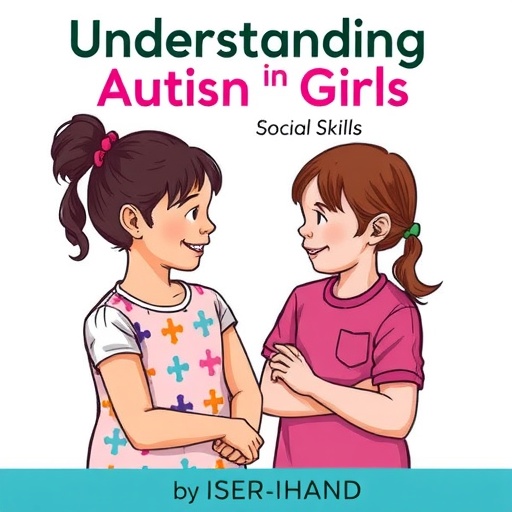In recent years, the intricate interplay between social communication, repetitive behaviors, and adaptive behaviors among individuals with Autism Spectrum Disorder (ASD) has gained considerable attention within scientific communities. A noteworthy exploration of these dynamics is presented by Burton, Creaghead, and Duncan in their groundbreaking study titled “Social Communication, Repetitive Behaviors and Interests, and Adaptive Behavior in Girls With Autism Spectrum Disorder Without Intellectual Disability.” This research is particularly pivotal because it focuses specifically on girls with ASD who do not have co-occurring intellectual disabilities, an area that has been relatively underrepresented in the existing literature.
The Autism Spectrum Disorder encompasses a broad array of presentations, and gender differences are paramount in understanding how these presentations manifest. Previous studies have mainly concentrated on the male population, often resulting in an incomplete picture of the unique challenges faced by girls with ASD. The new findings highlight the nuanced experiences that girls with ASD face, particularly in social contexts where their differences may not be as overtly apparent as in boys. Thus, this research not only fills a crucial gap but also emphasizes the importance of inclusive studies that reflect the diverse experiences of all individuals on the autism spectrum.
One of the most intriguing aspects of the study is its emphasis on social communication. Social communication involves the ability to interact and convey emotions and intentions effectively. The researchers delve deep into how these skills are developed and expressed differently in girls with ASD compared to their neurotypical peers. Social cues, which often serve as the backbone of interpersonal relationships, can be particularly challenging for these individuals. The study provides evidence that girls with ASD may display more subtle forms of social communication difficulties, which can lead to misunderstandings and social isolation.
Repetitive behaviors and interests often accompany ASD, serving as both coping mechanisms and means of navigation in an often overwhelming world. The study meticulously categorizes these behaviors and seeks to understand their implications on adaptive behavior. In a world that values flexibility and conformity, these repetitive behaviors can create significant challenges for those with ASD, particularly in educational and social frameworks. The researchers highlight how these behaviors can sometimes be misinterpreted as mere eccentricities, overlooking their role in providing comfort and structure in the lives of girls with autism.
Another critical aspect of this research is its investigation into adaptive behavior. Adaptive behaviors are life skills that individuals need to cope and thrive in everyday life, including self-care, communication, and social skills. The authors present compelling arguments about how the adaptive behavior profile for girls with ASD significantly differs from that of boys, often leading to unrecognized needs in educational and social services. This distinction has profound implications for how support systems are structured and necessitates tailored interventions that account for these differences.
The interplay between social communication, repetitive behaviors, and adaptive functioning creates a complex web, making it essential for practitioners and educators to consider these elements holistically. For instance, a girl exhibiting strong repetitive interests may struggle with social communication but excel in adaptive skills related to her special interests. Understanding these relationships is crucial for the development of effective, individualized strategies to support each girl’s unique needs.
Moreover, the societal implications of this research cannot be overstated. As awareness of autism grows, so does the necessity to advocate for and implement policies that address the specific needs of girls with ASD. This study challenges educators and policymakers to rethink current frameworks and encourages them to foster environments that are respectful of diversity and facilitate the social inclusion of all students, regardless of their neurodiversity.
In addition to the academic contributions, the research presses for a cultural shift in how autism is perceived and discussed. The stereotype that autism is predominantly a male condition can perpetuate harmful myths that dismiss the experiences of girls and women with ASD. By emphasizing the importance of inclusion and representation in autism research, the authors champion a more nuanced understanding that can lead to improved practices and supportive communities.
Ultimately, this research signifies a monumental step in autism studies, shedding light on a demographic that has been historically overlooked. The authors call for further research to build upon their findings, advocating for more comprehensive studies that include diverse samples and explore the full spectrum of experiences of individuals with ASD. The future of autism research must embrace this diversity to move towards a more accurate understanding of the condition and the wide-ranging needs of those who experience it.
In conclusion, “Social Communication, Repetitive Behaviors and Interests, and Adaptive Behavior in Girls With Autism Spectrum Disorder Without Intellectual Disability” by Burton, Creaghead, and Duncan provides invaluable insights into the unique experiences of girls with autism. It challenges existing paradigms, calls for greater awareness, and emphasizes the importance of tailored interventions. As our knowledge continues to evolve, so too must our approaches to supporting individuals with Autism Spectrum Disorder in navigating the complexities of their world.
The implications of such research extend far beyond the academic arena; they touch upon clinical practices, educational policies, and societal attitudes toward neurodiversity. By fostering a deeper understanding of autism in girls, we can begin to create more inclusive environments that celebrate differences and harness each individual’s potential.
Subject of Research: Autism Spectrum Disorder in Girls Without Intellectual Disability
Article Title: Social Communication, Repetitive Behaviors and Interests, and Adaptive Behavior in Girls With Autism Spectrum Disorder Without Intellectual Disability
Article References:
Burton, J.M., Creaghead, N.A., Duncan, A. et al. Social Communication, Repetitive Behaviors and Interests, and Adaptive Behavior in Girls With Autism Spectrum Disorder Without Intellectual Disability.
J Autism Dev Disord (2025). https://doi.org/10.1007/s10803-025-07035-z
Image Credits: AI Generated
DOI: 10.1007/s10803-025-07035-z
Keywords: Autism Spectrum Disorder, social communication, adaptive behavior, girls with autism, repetitive behaviors.




